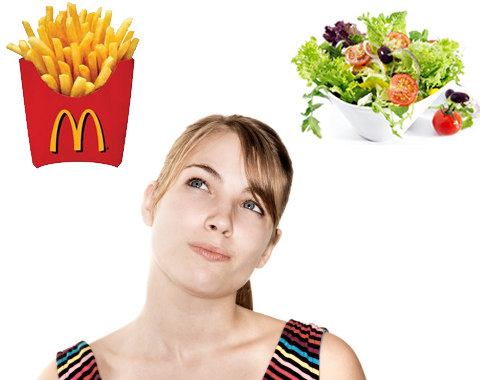Dietary Decoys

Imagine two restaurants, one of which sold only french fries as a side dish and another that sold both french fries and salads. Which would sell more fries? While logic might suggest that the salad would poach some of the side dish business, new research shows that adding a salad to the menu INCREASES sales of the less healthy fries!
Neuromarketing readers are used to human behavior being hard to predict and sometimes seemingly inexplicable. In Decoy Marketing, we showed how adding a less-capable product to one’s mix could boost sales of a better product priced the same or a bit more. And Compromise Marketing demonstrated how adding a new, more costly product to the lineup could increase sales of the previous top of the line model. But one has to admit that adding a salad to boost sales of french fries seems counterintuitive. Here’s what the researchers found:
In one study, college students were given one of two menus. One menu featured French fries, chicken nuggets and a baked potato; the other included those same items as well as a salad. The French fries, widely perceived as the least healthful option, were three times as popular with students selecting from the menu that had the salad as they were with the other group.
“When you consider the healthy option, you say, well, I could have that option,” said Keith Wilcox, a doctoral candidate at Baruch College who is one of the paper’s four authors. “That lowers your guard, leading to self-indulgent behavior.” [From The New York Times – Want Salad With That? Make It Fries by Alex Mindlin.]
Just ten percent of the subjects ordered fries when no salad was present, but thirty-three percent ordered fries when the salad was on the menu. The counterintuitive nature of this study continues with the finding that subjects with high self control (as measured by a psychological test) were MORE likely to be swayed into ordering the fries by the presence of the salad, while those with low self control were more likely to opt for the salad when it was present.
This is fascinating news for McDonalds and Burger King, but I think it may well have applicability beyond fast food. Most obviously, might a fine dining restaurant sell more steaks by offering, say, an option like baked salmon with steamed broccoli? Beyond food, other firms sell items which may be perceived as less healthy or less socially responsible. It certainly seems possible that the presence of a healthier or more socially responsible option could have the same effect of leading to MORE self-indulgent behavior. Would prominently listing an alcohol-free beer in a bar sell more alcohol? I don’t want to get carried away by extrapolating too far from fries and salads, but it seems that this simple experiment has revealed an interesting aspect to buyer behavior. Could this phenonomenon apply to YOUR products?
